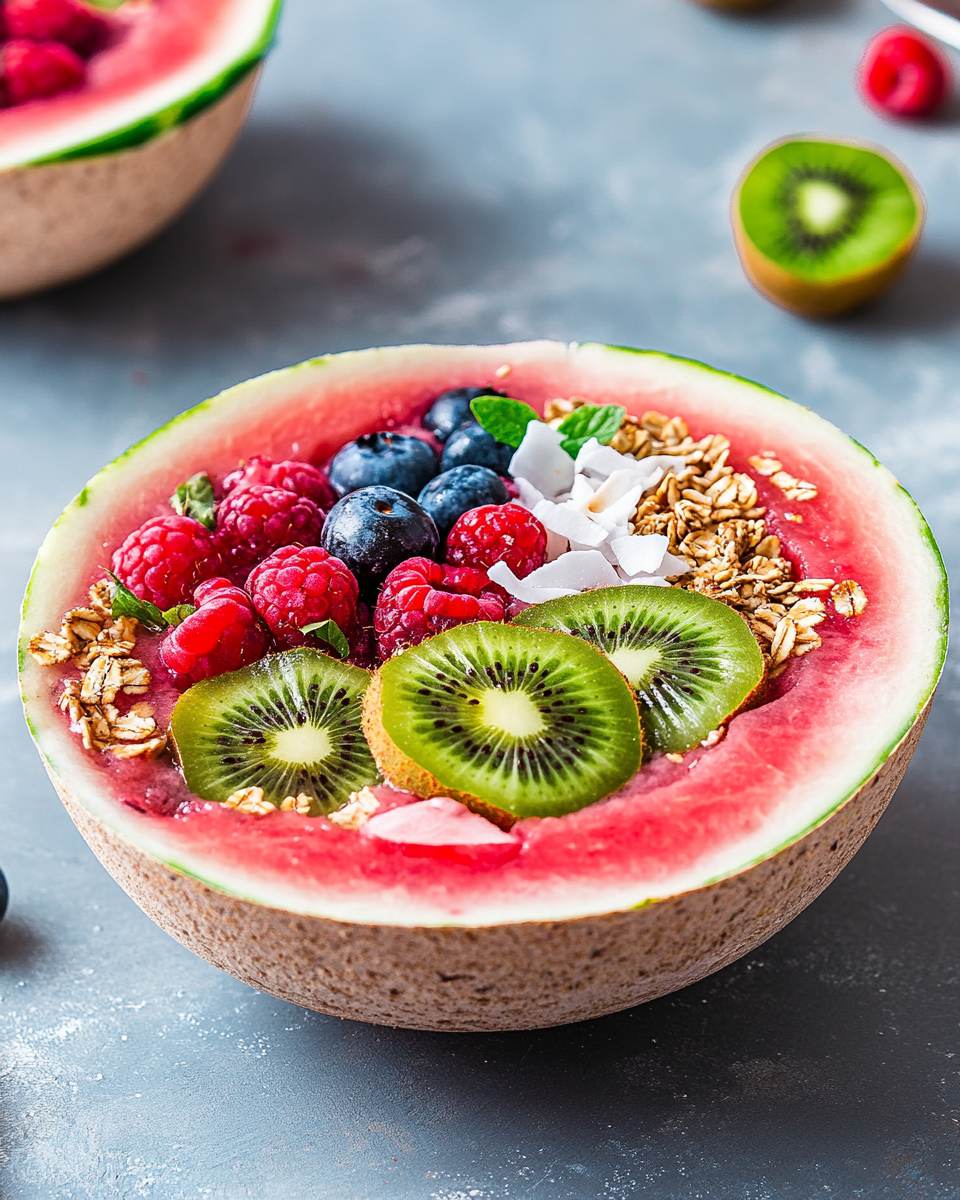This refreshing Watermelon Smoothie Bowl is the perfect way to start your day or cool down on a hot afternoon. Packed with hydration, fiber, and natural sweetness, it’s a healthy treat that’s as beautiful as it is delicious. Top it with your favorite fruits, nuts, and seeds for added texture and nutrients!
FULL RECIPE
Ingredients
- 2 cups watermelon (seedless, cubed and frozen)
- 1 frozen banana
- ½ cup plain Greek yogurt (or plant-based yogurt for vegan option)
- ½ cup strawberries (fresh or frozen)
- 1 tsp honey or maple syrup (optional)
- 1 tsp chia seeds (optional)
1.Toppings (optional)
- Fresh berries (blueberries, strawberries, raspberries)
- Sliced banana
- Shredded coconut
- Chia seeds
- Granola
- Mint leaves
Directions
- Add the frozen watermelon, banana, yogurt, strawberries, and sweetener (if using) into a high-speed blender.
- Blend until smooth and thick. If too thick, add a splash of milk or water to help blend.
- Pour the smoothie into a bowl.
- Decorate with your desired toppings.
- Serve immediately and enjoy!
Nutrition Facts
- Calories: 210
- Total Fat: 3g
- Saturated Fat: 1g
- Trans Fat: 0g
- Cholesterol: 5mg
- Sodium: 30mg
- Total Carbohydrates: 42g
- Dietary Fiber: 5g
- Sugars: 30g
- Protein: 8g
- Vitamin A: 15% DV
- Vitamin C: 60% DV
- Calcium: 10% DV
- Iron: 6% DV
- Potassium: 550mg
Nutritional Benefits of Watermelon
Watermelon is a hydrating fruit composed of over 90% water, making it an excellent choice for maintaining hydration, especially in warm weather. Beyond its refreshing qualities, watermelon is packed with essential nutrients like vitamins A and C, which support skin health and immune function. It also contains antioxidants such as lycopene and beta-carotene, which have been linked to reduced inflammation and may protect against certain chronic diseases. The natural sugars in watermelon provide a quick source of energy, while the fiber content helps with digestion and maintaining healthy gut flora.
The Role of Greek Yogurt in Smoothie Bowls
Greek yogurt adds a creamy texture and a protein boost to smoothie bowls, making them more satiating and balanced. It is rich in probiotics, which promote gut health by maintaining a healthy balance of bacteria. Additionally, Greek yogurt contains calcium, essential for strong bones and muscle function. Compared to regular yogurt, it has a thicker consistency and higher protein content, which helps in muscle repair and keeping you full longer. For those who prefer plant-based options, coconut or almond yogurt can offer similar creaminess, though with slightly different nutritional profiles.
Health Benefits of Strawberries in Smoothies
Strawberries are an excellent addition to smoothie bowls because they are low in calories but rich in vitamins, minerals, and antioxidants. They are particularly high in vitamin C, which is important for immune health, collagen production, and as an antioxidant. The flavonoids found in strawberries also have anti-inflammatory properties and may help reduce the risk of heart disease. Including strawberries enhances the flavor and adds a natural sweetness, along with a vibrant red color that makes the smoothie bowl visually appealing.
Natural Sweeteners: Honey and Maple Syrup
Honey and maple syrup are natural sweeteners often added to smoothie bowls to enhance taste without the use of refined sugars. Both contain antioxidants and trace minerals that can benefit health, though they should be used sparingly due to their high sugar content. Honey has antimicrobial properties and can soothe a sore throat, while maple syrup provides minerals like manganese and zinc. Choosing natural sweeteners supports a cleaner, more nutrient-dense diet, making your smoothie bowl not just tasty but healthful.
The Importance of Chia Seeds in Smoothie Bowls
Chia seeds are tiny nutritional powerhouses packed with omega-3 fatty acids, fiber, protein, and essential minerals like calcium and magnesium. When added to smoothie bowls, they absorb liquid and form a gel-like texture, helping to keep you full and aiding digestion. The fiber content supports gut health by promoting regular bowel movements and feeding beneficial gut bacteria. Additionally, the omega-3s contribute to brain health and reduce inflammation, making chia seeds a great functional ingredient to boost the nutritional profile of your smoothie bowl.
Hydration and Electrolyte Balance
Since watermelon is naturally high in water and potassium, this smoothie bowl helps maintain electrolyte balance and hydration levels in the body. Electrolytes are vital for muscle function, nerve signaling, and maintaining fluid balance. Potassium, in particular, helps counteract sodium’s effects on blood pressure, promoting heart health. Consuming foods and beverages rich in water and electrolytes, like this watermelon smoothie bowl, supports overall bodily functions, especially during physical activity or hot climates.
Smoothie Bowls as a Versatile Meal Option
Smoothie bowls are highly versatile and customizable, fitting a variety of dietary preferences and meal occasions. Whether you need a quick breakfast, a light dessert, or a nutritious snack, they can be adapted by changing ingredients and toppings. Adding nuts and seeds boosts protein and healthy fats, while fresh fruits increase fiber and antioxidants. They also cater to vegan, vegetarian, gluten-free, and dairy-free diets with simple substitutions. This adaptability makes smoothie bowls a popular and convenient option for health-conscious individuals.
How Smoothie Bowls Support Weight Management
Smoothie bowls, when made with balanced ingredients like fruits, protein-rich yogurt, and fiber, can help with weight management by promoting satiety and reducing unhealthy snacking. The fiber slows digestion and keeps blood sugar levels stable, reducing cravings for sugary snacks. Protein helps maintain muscle mass during weight loss and supports metabolism. By replacing high-calorie breakfasts or snacks with a nutrient-dense smoothie bowl, individuals can enjoy a satisfying meal that supports their weight goals without feeling deprived.
Environmental Impact of Choosing Plant-Based Ingredients
Choosing plant-based ingredients for smoothie bowls, such as fruits, seeds, and plant-based yogurts, can reduce your environmental footprint. Plant-based diets generally require fewer natural resources like water and land, and produce fewer greenhouse gases compared to diets heavy in animal products. Watermelon and strawberries are also seasonal and widely cultivated in many regions, which can make them more sustainable choices when sourced locally. Emphasizing whole, minimally processed ingredients further supports environmentally friendly eating habits.
Creative Toppings to Enhance Texture and Flavor
The toppings you choose for your watermelon smoothie bowl can add delightful texture contrasts and additional nutrients. Crunchy granola provides fiber and whole grains, while nuts offer healthy fats and protein. Seeds like chia or flax add omega-3s and fiber, and fresh fruits bring extra vitamins and sweetness. Coconut flakes contribute healthy fats and a tropical flavor. Adding fresh herbs like mint can brighten the bowl and offer digestive benefits. Experimenting with toppings lets you tailor your smoothie bowl to your taste and nutritional needs.
The Role of Antioxidants in Smoothie Bowls
Many ingredients in this watermelon smoothie bowl are rich in antioxidants, which are compounds that protect cells from oxidative stress and free radical damage. Lycopene in watermelon is a potent antioxidant linked to reduced risk of certain cancers and heart disease. Vitamin C from strawberries and watermelon supports the immune system and skin health. Consuming a variety of antioxidants through colorful fruits and seeds in smoothie bowls helps combat inflammation and promotes overall health and longevity.
Incorporating Smoothie Bowls into a Balanced Diet
While smoothie bowls are nutrient-dense and healthful, it’s important to view them as part of a balanced diet. They work best when combined with other food groups throughout the day to meet all macro- and micronutrient needs. For example, pairing your smoothie bowl with a source of healthy fats or additional protein can enhance satiety and nutrient absorption. Avoiding excessive added sugars and focusing on whole-food ingredients keeps the meal wholesome. When integrated mindfully, smoothie bowls contribute to sustained energy and well-being.
Conclusion
The watermelon smoothie bowl is more than just a tasty and visually appealing dish—it’s a nutritional powerhouse that hydrates, nourishes, and satisfies. Its combination of fresh fruits, creamy yogurt, and nutrient-dense seeds creates a balanced meal rich in antioxidants, vitamins, fiber, and protein. Versatile and customizable, it fits a wide range of dietary needs and lifestyle goals, supporting everything from hydration to weight management. Incorporating smoothie bowls like this into your diet can be a delicious step toward better health and wellness.






